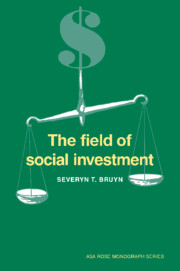Book contents
- Frontmatter
- Contents
- Preface
- Part I The idea of social investment
- Part II Social criteria and research
- 4 Social investment in business corporations
- 5 Social investment in industry: a new social policy
- 6 Social research on industrial policy
- 7 Investment in community development
- Part III Global social investment
- Epilogue: Social investment as a self-correcting movement in the market system
- Notes
- Bibliography
- Name index
- Subject index
- Title in the Series
6 - Social research on industrial policy
Published online by Cambridge University Press: 19 January 2010
- Frontmatter
- Contents
- Preface
- Part I The idea of social investment
- Part II Social criteria and research
- 4 Social investment in business corporations
- 5 Social investment in industry: a new social policy
- 6 Social research on industrial policy
- 7 Investment in community development
- Part III Global social investment
- Epilogue: Social investment as a self-correcting movement in the market system
- Notes
- Bibliography
- Name index
- Subject index
- Title in the Series
Summary
A new industrial policy is best grounded in a theory whose propositions can be tested and evaluated through empirical research. We have no such theory and little research activity to evaluate the consequences of implementing a new industrial policy. Our purpose here is to initiate steps in this direction, to develop the conceptual basis for a research paradigm that provides an integral view of the social and economic factors operating to affect the performance of industries. A theory is implicit in the conceptual foundation of this paradigm, and the propositions we suggest can be tested by following its guidelines.
We want to create a design for studying industrial performance that also provides insight into social self-regulation. Our task begins with a theoretical orientation that justifies trade groups as important to shaping industrial performance and providing a basis for self-regulation. Second, we outline a research paradigm that includes trade groups as one of many variables predictive of industrial performance. Third, in the light of our paradigm, we suggest hypotheses for the causes of high or low performance in particular industries. We are interested in how experiments could be conducted by social investors to reduce the necessity for government regulation. Then, we examine how paradigm studies could lead toward a theory of the public good. We come face to face with Adam Smith's concept of the invisible hand and the eighteenth-century argument for laissez-faire. We conclude with a discussion of how the private sector has been developing its own “invisible hand” to regulate the economy toward the larger public good.
- Type
- Chapter
- Information
- The Field of Social Investment , pp. 117 - 146Publisher: Cambridge University PressPrint publication year: 1987



